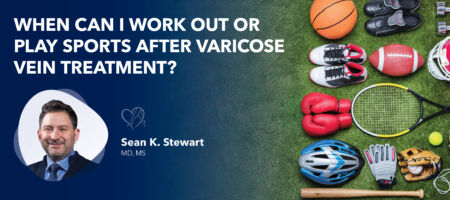
Medically reviewed by Sean K. Stewart, MD, MS, on October 10, 2025
If you’re considering treatment for varicose veins, you may wonder when you can safely exercise or participate in sports or other strenuous activities after a vein procedure. The answer depends on the procedure you had, your body’s healing process, and the guidance of a board-certified vein doctor.
That’s why, at Center for Vein Restoration (CVR), each patient receives an individualized recovery plan from a board-certified vein specialist.
//scheduling icon//
For this article, we consulted Dr. Sean Stewart, a board-certified vein doctor and the lead physician at Center for Vein Restoration's vein clinics in Annapolis, Maryland, and Columbia, Maryland. He provided general guidelines that are intended to help you understand what to expect as you gradually return to an active lifestyle.
📍 To schedule an appointment with Dr. Stewart in Annapolis, MD, CLICK HERE.
📌To schedule an appointment with Dr. Stewart in Columbia, MD, CLICK HERE.
🚩To schedule an appointment at any of CVR’s 120+ vein clinics nationwide, or click below ⬇️

Varicose veins are enlarged veins that commonly appear in the legs. According to the Society for Vascular Surgery, about one in four adults in the United States (that’s 65 to 70 million Americans!) have varicose veins. They develop when weakened vein walls and faulty valves allow blood to pool in the lower legs. The result can be leg heaviness, aching fatigue, and swelling.
These vein problems are not only cosmetic. Left untreated, vein disease can worsen and even lead to complications, such as blood clots, and skin changes, including skin infections and ulcerations.
Modern office-based techniques enable faster healing and reduce discomfort compared to older surgical methods. A review in the National Library of Medicine (NIH) found that methods, such as endovenous thermal ablation (EVTA) and foam sclerotherapy, reduce pain, speed healing, and improve quality of life compared to traditional surgery.

To determine when you can safely resume working out, it is helpful to understand the healing process following vein treatment. Below is a general guideline. (Always defer to your CVR vein doctor about your unique circumstances.)
1. Immediate to Day 1
2. First 1–2 Weeks
3. Weeks 2–4 and Beyond
Most patients return to normal daily activities immediately, but complete healing typically takes two to four weeks for smaller procedures. For more extensive treatment, recovery may extend to three to six months, depending on the specific treatments performed and the number of treatments required to correct the diseased veins.
After injection treatments: Smaller veins close first, followed by medium-sized veins, and then larger veins over several weeks. Irritation is common as veins of varying sizes shut down in phases. Wearing compression stockings can encourage healing and shorten the overall recovery period.
After heat treatments: Veins close immediately, causing mild discomfort for one to two weeks.
👉 Book your consultation with a CVR vein specialist today and discover how simple recovery can be
Even with minimally invasive vein care, it’s essential to follow your CVR doctor’s post-procedure instructions to reduce the risk of complications such as clots or infections.
Another thing to remember is that venous insufficiency is a chronic condition. You can expect to return for routine follow-ups, and additional procedures may be necessary in the future.
📞 Call Center for Vein Restoration at 240-965-3915
📅 Or book online HERE
As you recover, engaging in low-impact activities helps improve circulation and support the healing process. These include:
Your timeline for returning to sports depends on:
While exercise is well-tolerated, use your best judgment. This means that even though you are cleared, your veins may still be recovering. Here are guidelines and tips to help patients safely resume physical activity after vein treatment:
Successful vein treatment doesn’t end in the procedure room—it continues with a safe and guided recovery. Meeting with a CVR vein specialist helps ensure your progress is on track, reduces your risk of complications, and gives you confidence to resume exercise.
👉Book your follow-up today and let our team support your return to full activity.
Light activity, such as walking, often begins immediately after treatment, while sports and intense workouts usually require several weeks to resume. Patience pays off—rushing recovery risks setbacks, while following your doctor’s advice helps you return to full strength safely.
With today’s minimally invasive options and expert follow-up care, most patients can look forward to regaining healthy, pain-free legs and an active lifestyle.
